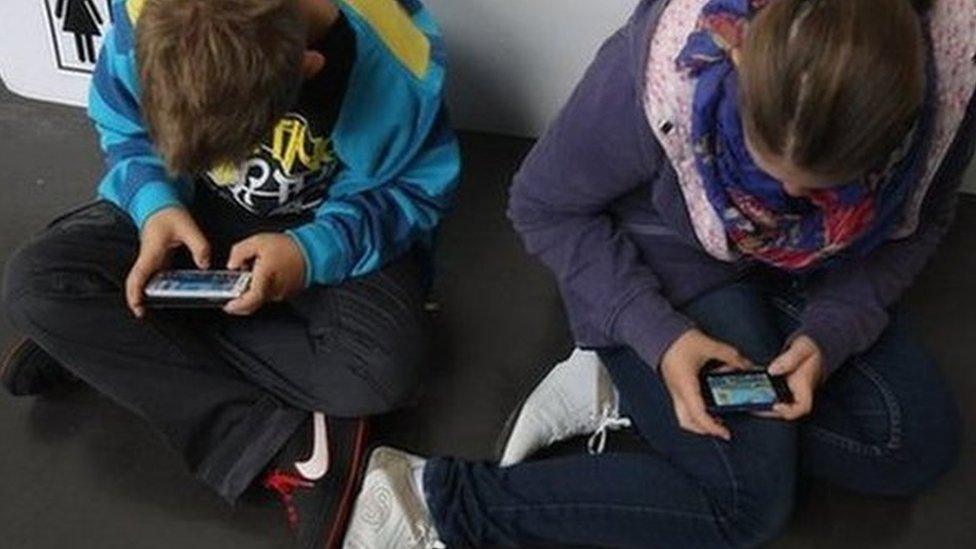Police arrest 320 dangerous UK child sex offenders
- Published

Some 320 of the UK's most dangerous child sex offenders have been arrested since the first coronavirus lockdown, the National Crime Agency (NCA) said.
Investigators have been focusing on tracking down offenders who operate online.
The operation led to a total of 4,760 arrests and 6,500 children safeguarded between April and September last year.
Meanwhile, the Home Office has launched a strategy to collect detailed data about child grooming gangs.
The Tackling Child Sexual Abuse Strategy aims to identify and convict offenders who operate in groups by gathering more information about their characteristics, including ethnicity.
It also involves investing in the national child abuse image database to identify offenders more quickly, protecting police from frequently being exposed to indecent images, and enabling parents to ask officers if someone with access to their child is known to them for cases of abuse.
Home Secretary Priti Patel said some who had suffered child sexual abuse had told her they felt "let down by the state", and insisted she was "determined to put this right".
Rob Jones, an NCA director, welcomed the initiative "at a time when the threat to children is more severe than it has ever been", highlighting that last year there were at least 300,000 people posing a sexual threat to children in the UK.
He said the NCA was focusing on the most dangerous offenders "as part of the whole system approach".
"Many feel they can operate with impunity online - using anonymisation techniques, secure accounts and the dark web - but as we have shown with this operation they are wrong and we have the capabilities to track them down," he said.
Mr Jones added: "These are not just images or videos being viewed online.
"What we are uncovering here is evidence of the horrific, real-world sexual abuse of children."
Out of the 320 arrested as part of the NCA's operation targeting the UK's most dangerous child sex offenders, 122 were targeted by NCA officers.
Seventeen were in positions of trust, including a volunteer with the Scouts, church youth group leaders, a social worker, primary school and college teachers, a hospital care assistant, a police officer, and a civil servant.
In the year ending March 2020 the NCA and UK policing made 7,212 arrests and safeguarded and protected 8,329 children. This was a 50% increase in arrests and a 10% increase in safeguards compared with the year ending March 2019.
'Tackle the abuse'
Ms Patel said that the national strategy would tackle and respond to "all forms of child sexual abuse, relentlessly going after abusers, whilst better protecting victims and survivors".
She added: "Crucially, it contains a commitment to collect higher quality data on the characteristics of offenders, so that the government can build a fuller picture of perpetrators, and tackle the abuse that has blighted many towns and cities across our country."
The government has pledged to support local authorities' responses to exploitation through funding for The Children's Society's Prevention Programme initiative, which has so far trained 13,363 professionals to spot signs of child abuse.
Through the Online Safety Bill, the Home Office has also said it will ensure technology companies are held to account for harmful content on their sites.
The Children's Society's chief executive, Mark Russell, has described the strategy as a "golden opportunity to improve support for child victims of horrific crimes and send a clear signal that child sexual abuse and exploitation are crimes that will not be tolerated".
The scheme was also welcomed by GCHQ and charity NSPCC, which said it has received more than 40 calls a day about child sexual abuse since the pandemic began.
GCHQ's director of serious and organised crime said: "Our work to tackle systemic internet problems, the insight we provide into offender behaviour and our efforts alongside law enforcement to identify and pursue the worst offenders will help to ensure there is no safe space online for these people to operate."
NSPCC chief executive Sir Peter Wanless said it "rightly puts the emphasis on early intervention and action across government but added it "must be backed up with serious investment in support for victims" - and that children were still being exposed to abuse from teachers and social workers.
Sir Peter said: "It's crucial that no young person is left unprotected which is why it's disappointing the government has not committed to closing the legal loophole that enables some adults to abuse their position of power to have sexual contact with 16 and 17-year-olds in their care."


Related topics
- Published3 September 2020

- Published30 September 2020

- Published8 December 2020
